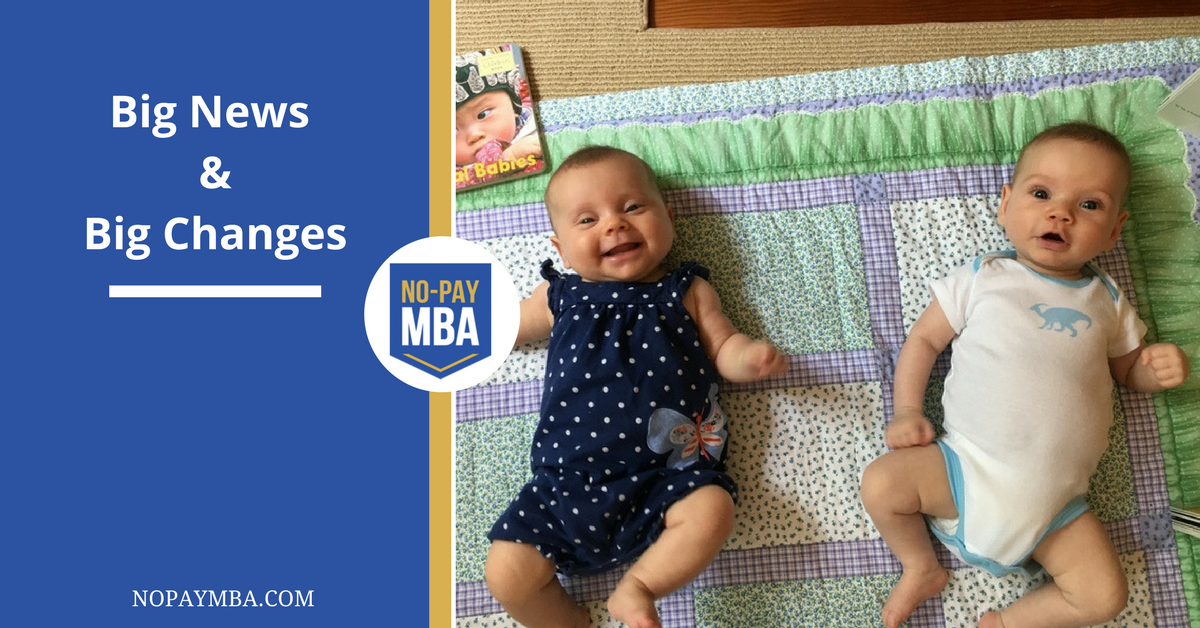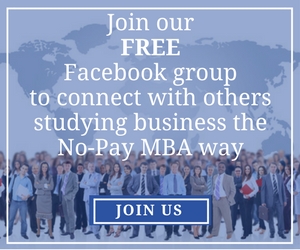by Laurie Pickard | Nov 28, 2017 | MOOC MBA Design, Thoughts on Higher Ed and Life
What to consider before you start a business education.

Four years ago, I hatched a plan to do my own “MBA” composed of free university courses (what I called a No-Pay MBA). At that time, MOOCs were just becoming more widely known, and many famous business schools were introducing new courses. I didn’t yet know how to calculate the financial value of an investment of time and money into a traditional MBA program (I would learn it later, in my first finance course), nor did I know how to compare that expected return with the value I hoped to reap from my DIY business education. I did, however, have an intuitive sense that a fully featured, prestigious MBA with all the bells and whistles (and all the debt) wouldn’t serve me as well as a more stripped down business education, designed and administered by me.
That hunch turned out to be right, but interestingly, it is only with the benefit of hindsight that I can fully account for the ways in which my decision not to pay for a regular MBA was a good one.
More than just financial return
The funny thing about trying to value an investment is that it always involves a bit of guesswork. You can calculate the net present value of an expected cash flow, but you can’t always predict with 100% accuracy whether said cash will trickle or gush. Even more importantly, while your quantitative classes will teach you to calculate return in dollars, for a big life decision like getting an MBA the money side is only one dimension of return. “Is an MBA worth doing?” is a bigger question than “Is an MBA a good financial investment?” Interestingly, even the Graduate Management Admissions Council, which publishes an annual report on the perspectives of MBA alums, doesn’t just focus on financial return but also asks whether graduates found the MBA professionally and personally rewarding.
The return on my No-Pay MBA
Having finished my own No-Pay MBA a year ago, I can now look backward with more clarity at what the return was on my investment of time and energy (and a small amount of money). The main career and life events that have transpired in my career since getting my MBA are the following:
1. In 2015, I got a $20,000 raise and moved into a new position in my current industry (international development). That alone would have made my modest investment “worth it” from a financial perspective.
2. In 2016, I got a book deal to write a book about how other people could get their own self-administered “MBAs”. That book was released this month. While the financial payoff from the book remains to be seen, I found writing a book extremely rewarding and enjoyable. Professionally, there are few honors more prestigious than being asked to write a book. That mark of expertise can’t be bought. It can only be earned.
The raise alone would have made my modest investment “worth it” from a financial perspective.
3. In 2017, I gave birth to twins and quit working. I expect to be a stay at home mom/author for at least the next year, maybe more. Being home with my children is the most rewarding job I have ever done. It was possible financially only because I don’t have any student loans to service.
And who knows what 2018 will bring. So, looking back on my decision to skip the traditional MBA and go my own route, would I have done it all again? Yes, Yes, and YES!! Though interestingly, only one of these outcomes - the first - was in my original calculation of the return of an MBA.
What return DON’T you want from your MBA?
Calculating your personal return requires using your imagination to envision what your life will be like with an MBA, but it should also include imagining a range of possible outcomes and worst case scenarios. You have probably already asked yourself questions such as, How much money will I make in my first job out of the MBA? And, what industry do I plan to work in? However, you may not have considered the negative case, i.e. What do I NOT want from my MBA?
What do I NOT want from my MBA?
For example, a few of the things I DIDN’T want from an MBA included working 80 hour weeks, moving for a job, working in finance or management consulting, or ending up being a stay at home mom with MBA debt. Not wanting those things influenced my decision to create my own business education rather than getting a traditional MBA.
As the adviser to independent business students, I encourage you to ask yourself these questions before you decide to get an MBA. These questions apply to all potential MBA candidates, and they aren’t the ones that are usually found on business schools’ websites.
How might my options be constrained by going into debt or spending my life savings?
What if I score my dream job, only to find that I don’t love the work?
What dreams are out of reach if I forego a traditional MBA? Am I sure those dreams are out of reach? How do I know?
If you end up with some doubts, do yourself a favor and fully explore the possibility of designing your own MBA program. The resources on this site are designed to help you do just that, as is my new book Don’t Pay For Your MBA.
by Laurie Pickard | Oct 11, 2017 | Most popular posts, Thoughts on Higher Ed and Life
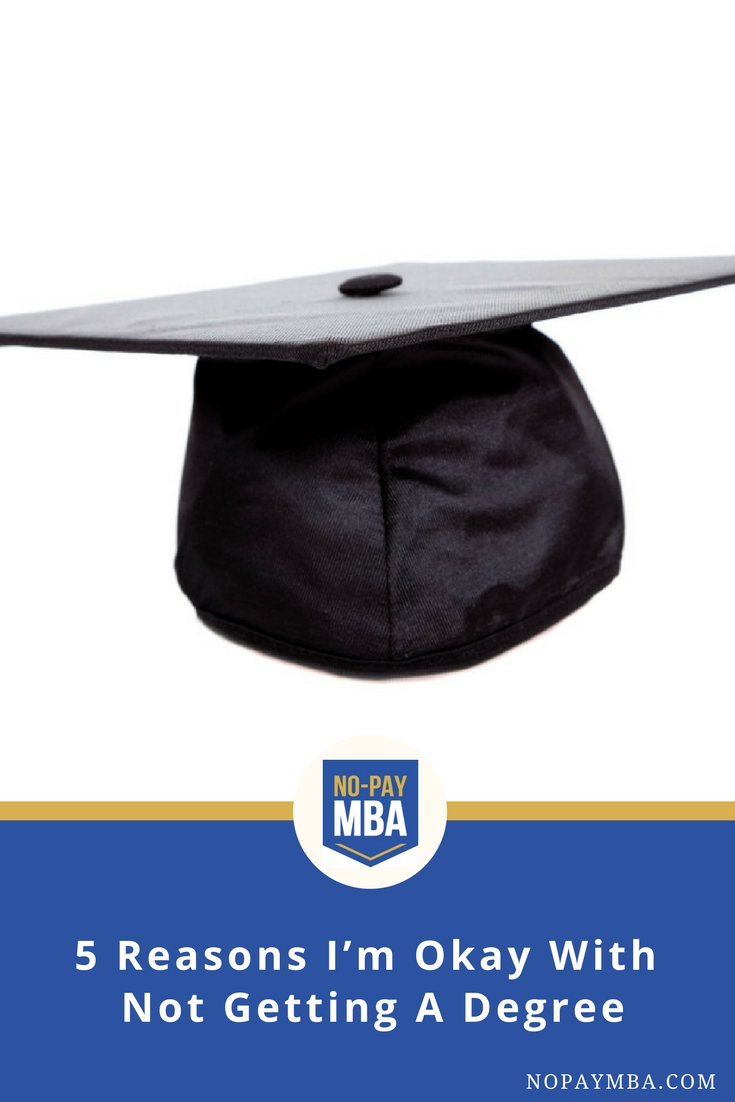
So did you get an MBA degree?
This is the question I field most frequently when I tell people that I created my own business education program using MOOCs and then wrote a book about it.
While I did get a fabulous business education, I did not get an MBA degree. I also didn’t get buried under a mountain of debt, nor did I waste time (or money) in classes that weren’t interesting or relevant to my career ambitions.
Perhaps you’ve considered taking a few business MOOCs, or even undertaking a complete MBA-style education as I did. If so, then you may also be wondering whether it makes sense to pursue an education that doesn’t come with that piece of paper.
Here are the top five reasons why a No-Pay MBA made sense for me, even without a degree.
Reason #1: I am confident in my ability to present my No-Pay MBA as a legitimate part of my education.
While some employers might not consider my resume due to the fact that I don’t have a true MBA, I expect that many will be intrigued by my choice to pursue an unconventional learning path. But don’t take my word for it, see this letter from CEO Mark Olvito. Once I get an interview, I’ll be happy to demonstrate my business skills and savvy. I also have my website to back me up – but you wouldn’t need a whole website to showcase your learning. A strong portfolio would probably do the trick.
Reason #2: Given m personal career ambitions, the investment in a traditional MBA wouldn’t have paid off.
I can certainly understand the financial case for getting an MBA, especially for people with very specific goals or people who want to enter certain industries (e.g. finance, consulting). But my situation is a little different. My career thus far is in international development – not known for salaries of the kind that make an MBA investment worthwhile. I enjoy this work and the opportunity it provides to have a globe-spanning career. Now that I have finished my No-Pay MBA, I plan to follow a more entrepreneurial path. Being debt-free leaves me open to riskier options, such as starting my own business or working for a startup. I am happy not to be saddled with a debt burden that constrains my choices. And I’ve done my homework. Check out the No-Pay MBA calculator if you want to know whether a No-Pay MBA makes financial sense for you.
Reason #3: The content of an MBA is valuable with or without the degree!
How cynical are we if we can’t see that the education itself has value, whether or not you get the piece of paper to prove it? In my view, what you get at a traditional business school has three components – the educational content, the network, and the degree. It is probably true that of those three, the slice that makes up the smallest share of the total price tag of an MBA is the educational content (which would help to explain why some top business schools are willing to give away their courses for free). Still, I believe that education has intrinsic value. And business education has more than intrinsic value. Ask me how much my No-Pay MBA was worth after the next time I conduct a salary negotiation using what I learned in Successful Negotiation.
My No-Pay MBA did earn me a promotion and a sizeable raise. I was also able to start putting my new skills into practice immediately on the job, bringing additional value to my employer right away.
Reason #4: An MBA isn’t usually required.
For many jobs an MBA is a “nice to have.” In only a few jobs is it a “must-have.” Marketing strategist Dorie Clark recently wrote an article for the Harvard Business Review titled “Do You Need a Formal Degree, Or Will a MOOC Do?” As Clark points out, “having an MBA may be considered a selling point, but it’s rarely required for a particular job.” She goes on to say that in industries in which MBAs are relatively uncommon, getting one may be “overkill”, especially when there are other options for acquiring the skills that are valued in your industry.
Reason #5: The MBA is no longer the only credential in town.
The MOOCs platforms are hard at work creating credentials that will hopefully have real value in the job market. So-called “microcredentials” encompass many kinds of credentials that are less than a full degree, including verified certificates of completion from the MOOC providers, Udacity’s Nanodegrees, and edX’s MicroMasters, among others. EdSurge recently reported that these kinds of credentials are proliferating. During my studies, I earned many MOOC Statements of Accomplishment, some of which I display in my portfolio.
So yes, I took a risk by getting a business education that didn’t result in a degree. It cost me much, much less than a traditional MBA would have, and it paid off in both financial and personal ways. What about you? Do you think a business education can be “worth it”, even if it doesn’t result in an MBA degree?
by Laurie Pickard | Sep 18, 2017 | Career Development, Most popular posts
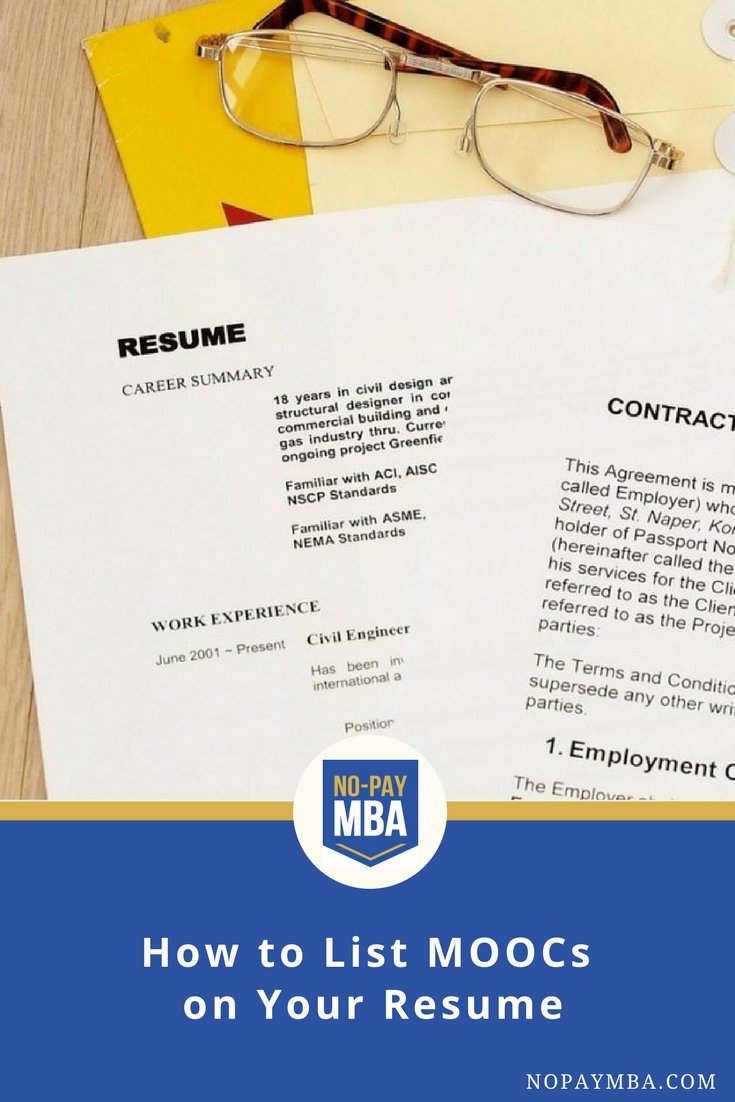
So you’ve finished a slew of business MOOCs. You’ve balanced T-accounts, analyzed throughput, calculated the net present value of an annuity, and considered the finer points of project management. Now you’re ready to leverage your new skill set in your search for a new job. What’s the best way to put a MOOC business education on your resume?
How do you showcase your MOOC coursework on your resume?
I’ve been asked this question many times – in comments on the blog, in emails from readers, and in interviews with the media. It’s also a topic I cover in my new book Don’t Pay For Your MBA. Fortunately, there is no single right way to put MOOCs on your resume.
My high school English teacher used to say, “All writing is creative.” While your resume should be based in fact, not fiction, you can absolutely use some creativity when highlighting your MOOC-based business education. Below are four places MOOCs might show up on your resume. Be sure to download the free resume template that accompanies this post for more advice on how to showcase MOOCs on your CV.
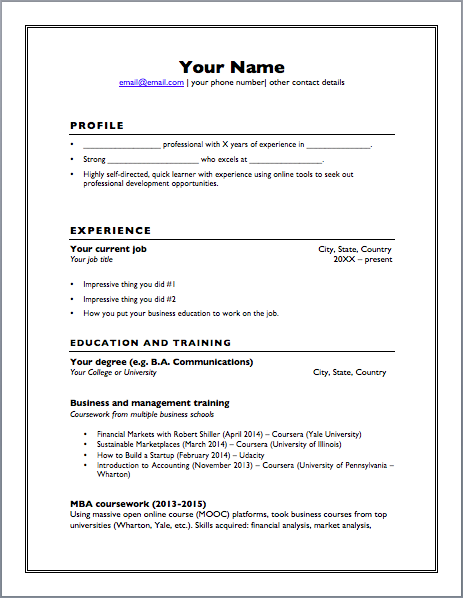
Your Professional Summary
The first place you might put your MOOC education is in a professional summary at the top of your resume. In addition to other information about your professional history and goals, you could add a line like, “Self-directed, quick learner with experience using online tools for professional development.”
Not everyone uses a professional summary on their resume, but if you do, this is one place your MOOC education can appear in a subtle way. This allows you to start painting a picture of yourself as a self-motivated, self-directed learner.
Your Experience Section
If you’ve used anything you learned in a MOOC to achieve real outcomes on the job, you should absolutely brag about that experience on your resume. When I’ve talked with recruiters about candidates who have used MOOCs to get ahead in the job market, they all say that experience is more important than education. So, if you got the education and it translated into direct experience, you should absolutely play up that experience. You don’t even have to include the name of the course you took. Instead, you can just focus on your accomplishments.
Your Education and Training Section
This is where you’ll talk about your MOOC coursework most explicitly, by actually listing some or all of the courses that you took. If you took a set of courses that you put together yourself, give your education a title - for example, “Advanced Business Courses” or “Master’s-Level Business Coursework.” (The resume template lists several options.) Then list the most relevant courses you took, including the universities that offered them and the dates you completed them. If you took a pre-packed set of courses, such as a Coursera Specialization or an edX Micromasters, you can simply list it.
You might also want to include a sentence describing your education (many people are still unfamiliar with MOOCs) and include a few of the skills you learned. For example, you could say something like: “Using massive open online course (MOOC) platforms, took business courses from top universities (Wharton, Yale, etc.). Skills acquired: financial analysis, market analysis, business planning, product development.
If you are listing individual courses, include only those that are relevant to your industry. And don’t list a lot of intro-level courses. Instead, focus on the most advanced coursework that is most specific to your job aspirations.
Your Skills Section
Finally, you might include a special Skills section of the resume, where you list some of your more relevant business skills, including those that you learned in your MOOC coursework. Like the Professional Summary, this is a section of the resume that not everyone uses. If you choose to include it, make sure you aren’t simply repeating information from earlier in the resume.
I’m interested to hear which of these options for listing MOOC coursework on a resume you find most appealing, as well as other ideas that I haven’t thought of, or any approach you are already using. And if you’ve managed to use MOOCs to score a new job, let’s hear how you did it!
by Laurie Pickard | Jun 4, 2017 | Uncategorized
I haven’t written a blog post in quite a while. There’s a good reason for that.
Maternity Leave
In February 2017, I gave birth to beautiful twin babies, a boy and a girl. Needless to say, having babies (two of them!) has been a tremendous life change. I haven’t had much time to take classes, write blog posts, or do anything other than nurse and change diapers.
I look forward to writing about new motherhood and how it relates to business education (which it does!) when I return from my 6-month maternity leave.
DON’T PAY FOR YOUR MBA BOOK LAUNCH
My other big news is that my book, now titled Don’t Pay For Your MBA, is scheduled to come out in November 2017. I can’t wait!
Many thanks to those who provided opinions on the cover and title of the book. The publisher took your thoughts into account when designing the final cover. I am really pleased with it!
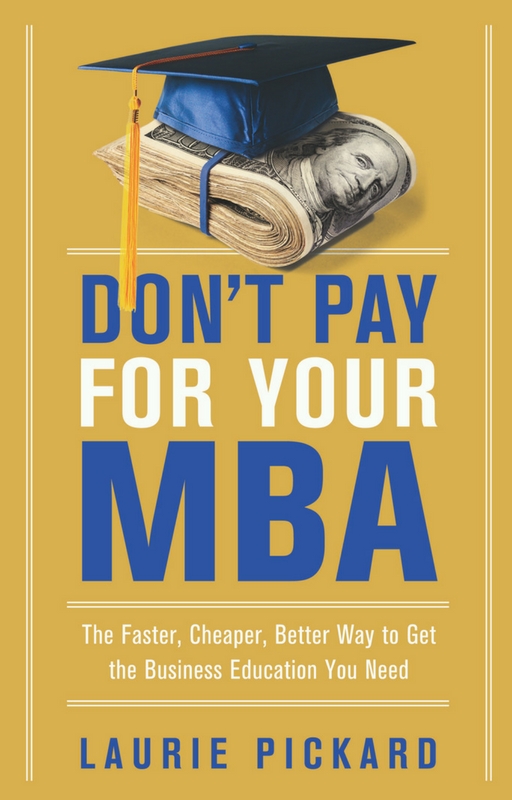
Join the No-Pay MBA Facebook group
If you’re interested in being part of a community where independent business students can meet each other, then I encourage you to join the No-Pay MBA Facebook group. This is a great place to find study buddies, get tips on courses to take, and share experiences of self-directed business education. It’s also where I go to gather input from people who are still actively taking courses.
by Laurie Pickard | Jan 17, 2017 | Thoughts on Higher Ed and Life
Is the fitness industry showing us the path education will take in the not-so-distant future?

It’s January, and like other gym-goers, I can’t help but notice the uptick in attendance. The classes are a bit more crowded; it’s harder to find an open treadmill or an empty lane at the pool. It’s New Year’s resolution time, after all, and everyone is getting in shape, signing up for personal training services, and squeezing in shoulder to shoulder in hot yoga classes.
Being in the gym at this time of year has gotten me thinking about the many parallels between fitness and education, as well as the striking differences in how these services are delivered and consumed. I’ve started wondering whether the fitness industry might be showing us the path that education will take in the not-so-distant future.
Exercisers Are Like Lifelong Learners
As both a committed exerciser and a lifelong learner, I can see obvious similarities between these two types of self-improvement/self-maintenance. First, both are habitual practices that are developed over a lifetime. Both physical fitness and mental sharpness are best maintained as part of an overall lifestyle, not in one-off binge sessions or by cramming.
Second, both exercising and learning require willpower and self-discipline. It’s not always easy to get out the door to go to the gym, just as it’s not always easy to work through a difficult reading assignment or tough problem set.
Third, in order to really do you any good, both learning and exercising have to be challenging enough to require real effort. Anything less doesn’t achieve the desired effect.
Finally (and fortunately), both education and exercise become more enjoyable and require less willpower the more ingrained the habit becomes. So, while it may hurt at first, tying on your shoes and hitting the pavement eventually becomes its own reward. And so does working your way through a difficult course.
In order to really do you any good, both learning and exercising have to be challenging enough to require real effort. Anything less doesn’t achieve the desired effect.
Education Is Not Personal Fitness…Yet
Despite these similarities between lifelong learning and lifelong personal fitness, the differences between these two pursuits remain stark. Much of education is delivered in one-size-fits-all packages, where a one-time achievement (earning a degree) is singularly important and sets a learner down a path that may be difficult and costly to change later on. We know this because while every job announcement lists which degrees an applicant ought to hold, almost none request applicants with an ongoing practice of learning or ask what an applicant has learned in the years since graduation from a degree-granting institution.
Applying the same logic to exercise, no one would hold up the college athlete who has fallen woefully out of shape as the paragon of physical fitness. So why do we consider the one-time achievement of earning a degree so much more important than the learning a person continues to do throughout a career and a life?
From a Hobby to the Basis for Hiring
In a recent column in EdSurge, Amy Ahern mused on her experience using a digital fitness app to augment her exercise habits. Unlike fitness apps, she observed, online classes too often feel isolated and removed from experiences and practices that take place outside the digital classroom. While she often found it hard to find the time to complete a MOOC, she was excited each day to log miles in her fitness tracker. As an instructional designer, Ahern was interested in how online courses could create this kind of “stickiness”. Like Ahern, I believe that education could learn from fitness.
Today nearly everyone knows that developing an exercise habit is a good thing to do, and methods for establishing that habit abound. Gyms offer equipment you can use on your own, group classes in disciplines ranging from Pilates to kickboxing to weight lifting, personal training, and specialized preparation for competitive races. Books, apps, home workout DVDs, and streaming services add more ways a person can develop an exercise practice on terms that work for them.
So, what would it mean for education to look more like fitness?
First, we could start by recognizing the importance of lifelong learning not as a fringe hobby but as a vital pursuit integral to a full and healthy life and a successful career. What I love about MOOCs is that they open up possibilities for individuals to direct their own learning efforts.
Second, education companies could expand their delivery methods. Just as physical fitness takes a variety of forms, so could education.
Like group classes at the gym, social learning opportunities could make learning more enjoyable and help people stick with it.
Open access courses such as MOOCs are a great start. Education apps could help keep people motivated. In the vein of group classes at the gym, social learning opportunities, such as in-person meetup groups, facilitated projects, online office hours, networking, etc., could make learning more enjoyable and help people stick with it.
Finally, employers could shift their focus away from brand-name degrees and toward objective performance. Just as it doesn’t matter whether I run on the treadmill at 24-Hour Fitness or on the one in my basement, it shouldn’t matter where or how I learned to conduct a net present value analysis or an A/B test. As the lifelong learning company Degreed proclaims in its mission statement, “There is no single path to expertise…The challenges of the future won’t care how you became an expert, just that you did.” Ideally, employers would learn to take advantage of the expanded educational landscape and the multiplicity of paths to expertise, becoming more able to assess a candidate using objective measures, taking into account the skills he or she has developed outside of any institution.
“Hold on,” one might argue, “aren’t the stakes different between exercise and education? In one case, you’re talking about entirely personal goals (health, wellness) and in the other you’re talking about goals that affect a person’s career trajectory.” Indeed. My fitness level is primarily important to me, while my education level, my smarts, and my skills are important to the people who would hire me. Which is why it is all the more important that education become more like fitness, with employers more able to evaluate candidates’ ongoing learning efforts and continuous skills development, not just the work they did before entering the workforce.
Looking ahead, I am optimistic. I predict that the education industry will come to adopt some of the attitudes, techniques, and modes of delivery that have come to characterize the fitness industry. In the process, we all stand to win.






